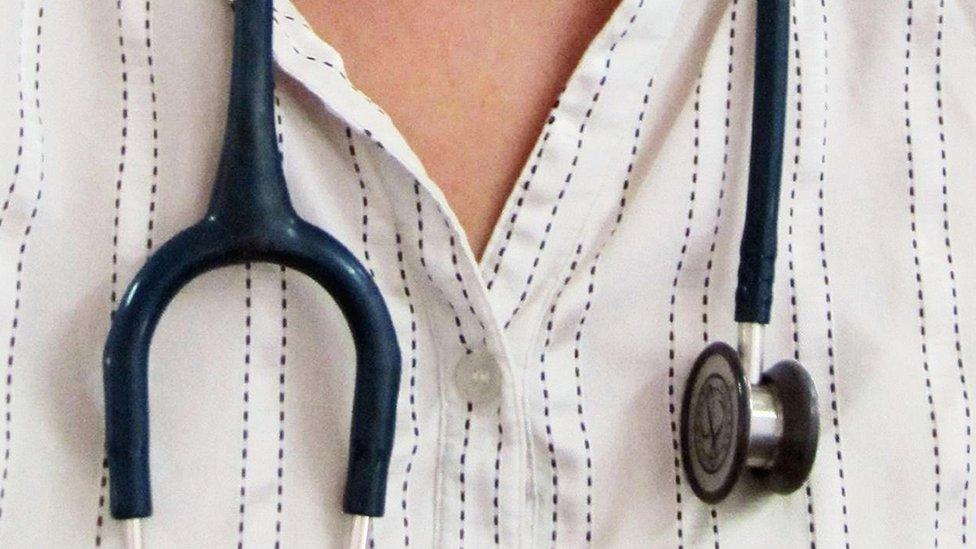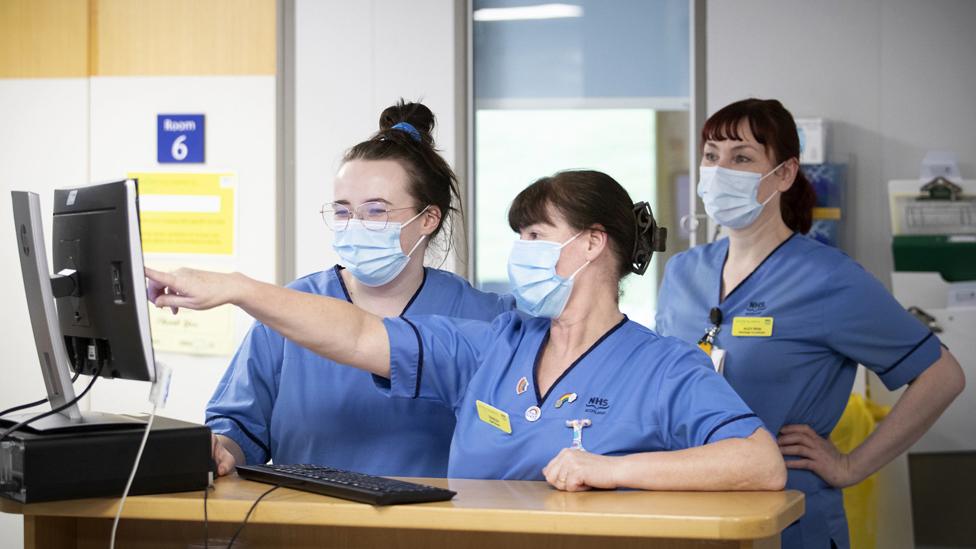NI health: Only one in four vacant consultant physician posts filled
- Published
- comments

Only 27% of advertised consultant physician posts in Northern Ireland were filled in 2021, a professional body has said.
The Royal College of Physicians (RCP) said this was a drop from three-quarters in 2018.
The RCP called on Northern Ireland Assembly members to form an executive, ahead of the deadline at midnight.
It said without a multi-year budget, the health system could not invest in people, places or performance.
Health Minister Robin Swann welcomed the college's call for a multi-year budget.
The RCP held an event in Belfast in September with doctors, health officials, government representatives and academics to get an assessment of the current situation.
It found the lack of a functioning executive was the overarching issue facing Health and Social Care Northern Ireland (HSCNI).
Doctors also highlighted recruitment issues and warned that the workforce was exhausted and reaching burnout.
"It is now extremely difficult to recruit and retain staff, and there are big rota gaps for consultants and trainees in every hospital in Northern Ireland," the organisation said.
"HSCNI relies excessively on a locum workforce, which is expensive and inefficient."
Recruitment difficulties at Daisy Hill Hospital, in Newry, and the South West Acute Hospital, in Enniskillen, have been well-publicised, with both struggling to fill surgeon posts.
'Strategic direction'
RCP president Dr Sarah Clarke, who attended the meeting, said: "The medical workforce crisis in Northern Ireland is getting worse.
"In 2021, only 27% of advertised consultant physician posts in Northern Ireland were filled, with 33% of unsuccessful appointments being down to a total lack of applicants.
"This is a frightening drop from 2008, when 83% of advertised posts were filled, or even just a few years ago in 2018, when the figure for Northern Ireland was 73%.
"Doctors, nurses and allied health professionals need political stability, strategic direction and recurrent funding so they can start to tackle waiting lists, rota gaps and growing inequalities."
Consultant physician Aidan O'Neill said long-lasting reform for the health service needed executive funding and planning.
"Nearly 40% of consultants are planning to retire in the next 10 years," he said.
"There are lots of gaps in the rota and that is quite fragile and not sustainable because there isn't the reserve there to deal with an extra pressure and I think we will probably see that in winter."

In 2021, only 27% of advertised consultant physician posts in Northern Ireland were filled, according to the college
"Robin Swann has repeatedly pressed the case for guaranteed multi-year funding to ensure sustained investment and longer term planning," a spokesperson for the Health Department said.
"Northern Ireland's health service has instead been left with no confirmed budget at for all this year.
"Sustained investment will not fix all the problems facing health and social care. However, they will not be resolved without it."
The Department of Health accounted for 49%, or £7bn, of the executive's budget in 2021/22 - that total included funding for social care.
A draft three-year budget had proposed a 10% increase in health spend, but that needs to be signed off by ministers.
Stormont's ministers, collectively known as the Northern Ireland Executive, have been unable to take major decisions since February, when the Democratic Unionist Party (DUP) pulled its first minister out of office in protest over the Northern Ireland Protocol.
The party is refusing to go back into power-sharing government until issues around the post-Brexit trade deal are sorted.
The college's report from the briefing puts forwards 24 recommendations.
It also featured findings from its 2021 census of thousands of consultant physicians and higher specialty trainees in the UK.
Nearly 750 of the respondents work in Northern Ireland and their survey suggested:
53% of consultant physicians report daily or weekly trainee rota gaps
40% of consultant physicians say they have substantive consultant vacancies in their department
28% of senior trainee doctors say they almost never feel in control of their workload
41% senior trainees say they feel emotionally drained at work almost all or most of the time
58% of senior trainees say they work excessive hours and 55% have an excessive workload
75% of senior trainees report daily or weekly rota gaps
Meanwhile the union Unison is balloting members over industrial action.
The union said the ballot was prompted following a recommendation from the Pay Review Body.
A Unison statement said it was "insufficient to cover the needs of health workers who have been at the frontline of the Covid pandemic and are now facing a cost of living crisis."
The union also said Westminster had not made additional funds available to the health service in Northern Ireland.
Anne Speed from the organisation said porters, nurses, security guards, paramedics, cleaners, midwives, occupational therapists, social workers and other health and social care staff in Northern Ireland would be given the opportunity to vote for industrial action and action short of strike.
Related topics
- Published19 October 2022

- Published17 October 2022

- Published27 September 2022

- Published10 February 2022

- Published27 October 2022
